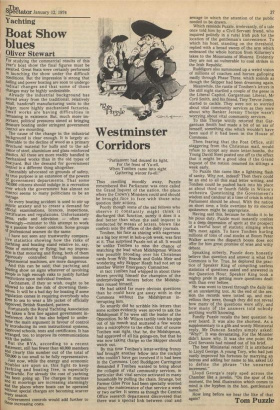Yachting
Boat Show blues
Oliver Stewart
For studying the commercial results of this Year's boat show the final figures must be awaited. Great feats were certainly performed in launching the show under the difficult conditions. But the impression is strong that sailing and power boating are soon to undergo radical changes and that some of those Changes may be highly undesirable.
Already the industrial background has Moved away from the traditional, relatively small, handcraft manufacturing units to the larger, more highly mechanised factories. Small works are having difficulties in remaining in existence. But, much more imPortant, political pressures aimed at bringing Pleasure boating under stringent government control are mounting. The cause of the change in the industrial background is clear enough. It is largely attributable to the decline of wood as a primary structural material for hulls and to the advance of steel, aluminium and glass reinforced Plastics. All these are more readily handled in mechanised works than in the old types of boatyard. But the demand for government control is a different thing altogether.
Ostensibly advocated on grounds of safety, its true purpose is an extension of the powers
f government departments. That some 150,000 citizens should indulge in a recreation over which the government has almost no control seems to many politicians to be an outrage. So every boating accident is used to stir up Public anxiety and to create a demand for official examinations, licences, inspections, certificates and regulations. Unfortunately Press, radio and television — often unknowingly—minister to this attempt to work 1-1,1) a passion for closer controls. Some groups (3t Professional seamen do the same.
I have not seen any trustworthy comparative statistics showing how the risks of Yachting and boating stand relative to, say, those of motoring or flying; but my impression is that motoring and flying, both of them rigorously controlled through immense departmental machines, are more dangerous.
And this can be said; that yachting and boating show no signs whatever of involving People in high enough risks to justify further restrictions upon individual freedom. Yachtsmen, if they so wish, ought to be allowed to take the risk of drowning themselves. It will be a bad day for boating if some regulation comes in requiring everybody who goes to sea to wear a life jacket of officially approved, British Standard, pattern. Fortunately the Royal Yachting Association has taken a firm line against government interference. And it has also helped to under;nine the main argument in favour of control oY introducing its own instructional systems, approved schools, tests and certificates. It has arranged, too, to improve its communications With the public. But the RYA, according to a recent statement, still has fewer than 40,000 members ,and clearly this number out of the total of 150.000 is too small to be fully representative. Just now, while the energy and economic troubles are upon us, this fight to keep Yachting and boating free, is especially Worthwhile. For already the cost of yachting has been going up. The charges in marinas and at moorings are increasing alarmingly and the places where boats can be operated without special charges are becoming scarcer every season.
Ln„ Government controls would add further to ese increasing costs.


































 Previous page
Previous page